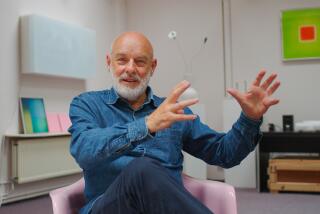Detours From the Information Superhighway : ESSAYS : MINUTES OF THE LEAD PENCIL CLUB: Pulling the Plug on the Electronic Revolution,<i> Edited by Bill Henderson (Pushcart Press: $22; 234 pp.)</i>
- Share via
For the sake of a point, let’s divide things this way: There is only one kind of people, but there are two kinds of questions.
There are questions we ask each other. Did O.J. do it? Can Dole beat Clinton? Do I look better in red or green?
And, there are questions we increasingly face alone, if at all. What is the meaning of life? The nature of God? Do we control technology or does it control us?
We are socialized for the first group of questions. We ask them easily, maybe earnestly, but without reservation. Then we compare your answer to mine, and we have a basis for quick conversation.
The second variety is more problematic. That’s because an essential component of the answers lies inside each of us according to our character and our degree of enlightenment. Digging there goes beyond what kind of society we have to what kind of a person we are. Comparing your answers to mine is not conversation but metaphysics.
In other words, these are fundamental and moral questions. God. Meaning. And, yes, technology, too.
We include technology with these other lofty matters because of its power to change not only the way we live, but what we live for.
And that warrants a little moralizing along the way, don’t you agree?
If you, for instance, are issued a beeper by your boss, how far have you come, really, from the shuffling servant summoned by the tinkle of a bell to clear the plantation master’s dinner table?
Technology has advanced to whose benefit, master or servant?
Twenty years ago, it was a sign of lunacy when someone claimed his or her body had been electronically wired by outside forces. Today, a beeper sounds in a restaurant and a dozen people calmly glance at their belts. Similarly, virtual reality seems hellbent on eliminating our most reliable measure of mental soundness: the ability to discern that which exists.
“The Minutes of the Lead Pencil Club” is composed of 42 argumentatively anti-technology essays. Unplug, tune out, drop back in. And yes, behind the book is a club. Sort of, or at least a membership list of like-minded men and women who share the watchword “not so fast.” Bill Henderson’s introduction explains and invites you to “join.”
Such a volume provides only barest haven from the advancing flood of pro-technology, gee-whiz propaganda. But the more fingers in the dike the better--and here are some strong ones: Russell Baker, Wendell Berry, Doris Grumbach and dozens more.
Shall we interject: There is but coincidental connection between the healthy skepticism expressed here and the violent obsession of the Unabomber. One man’s madness against technology does not make a case for the converse. Most of the pieces here are calmly reasoned; some light, a few strident. Where did the pencil originate and from what is it made? What is happening to our children in the isolation of video? Or another essay, the point of which is made by its title “Slower Was Faster.”
Andrei Codrescu has fun with the idea of adding memory to one’s computer. Where does all this memory come from, exactly? Leonora Holder ponders the rush to put computers in classrooms-- even if among the students is an immigrant Hmong who has not yet learned the purpose of a chair. Ron Tanner ponders the joy of old-fashioned letters, for the benefit of the writer, not just the recipient. Franklin Saige argues that the information superhighway is really but another fancy road to mass-market consumerism.
Interspersed in the volume are two poems, a few cartoons and an entertaining collection of short quotes and observations, such as this one by Neil Postman:
“Attend any conference on telecommunications or computer technology, and you will be attending a celebration of innovative machinery that generates, stores and distributes more information, more conveniently, at greater speeds than ever before.
“To the question, ‘What problem does the information solve?’ the answer is usually ‘How to generate, store and distribute more information, more conveniently, at greater speeds than ever before.’ ”
Dorianne Laux’s ironic love poem “As It Is” is more tender than any 1 1/2 pages I have ever read in a book on the subject of machines.
Combined, this collection asks us to view technology in that old, uncomfortable way: to ask not just what it’s doing to society, but what we as individuals are doing about it.
Ever since Ned Ludd smashed his mechanical weaving loom into pieces and thereby lent his name to all us doubters, or Luddites, we have been told that there is nothing we can do. Technology is an unstoppable force, like the rotation of the globe.
“The Minutes of the Lead Pencil Club” helps us rewind and recalibrate our thinking. Yes, technology is unstoppable. But, unlike the rotation of the planet, its direction can be altered in our own interests. This book makes us believe this is not only possible, but essential. And for that most selfish and noble of reasons: because it pleases us.
So far, the age of technology has given us a half-truth and a great lie.
It is half true that technology makes living better. We are less vulnerable to disease as a result of technology. No need to argue further. But it is also true that technology accelerates the forces of stress.
As for the great lie, it is this: The machines of technology will do the work and leave us more time.
Not yet, not by a long way.
The Lead Pencil Club reminds us that T.S. Eliot did not need a computer to understand the problem of having one:
“Where is the life we have lost in living?
“Where is the wisdom we have lost in knowledge?
“Where is the knowledge we have lost in information?”
Would I give up the airplane, painless dentistry or the telephone? No. But neither will I forfeit wax candles at dinner, original paintings in museums or the canoe to get me down a freestone stream in summer.
Question authority, said Henry David Thoreau. The Lead Pencil Club updates that to read: Question the authority of technology.
And as you may know, Thoreau was a maker of lead pencils.
More to Read
Sign up for our Book Club newsletter
Get the latest news, events and more from the Los Angeles Times Book Club, and help us get L.A. reading and talking.
You may occasionally receive promotional content from the Los Angeles Times.










